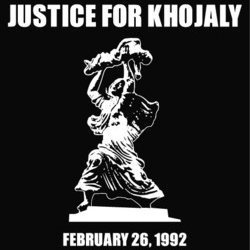Azerbaijan, Baku, Feb. 19 / Trend T.Hajiyev /
Ceremonies of remembrance of victims of the Khojaly genocide, conference and exhibitions dedicated to the 19th anniversary of the Khojaly tragedy will be held in several countries.
Events dedicated to the Khojaly tragedy will be held in Moscow, St. Petersburg, Yekaterinburg and other cities of the Russian Federation through the organizational support of the All-Russian Congress of Azerbaijanis, the Russian representative office of the Heydar Aliyev Foundation and Russian Azerbaijanis Youth Organizations. The events stipulate holding of roundtables and conferences, demonstration of photographs and documentaries about the murder of civilians in Khojaly, the State Committee on Work with Diaspora told Trend.
Such activities will also be held in Ukraine, Belarus, Estonia, Lithuania, Latvia and Moldova.
Representatives of the Azerbaijani, Turkish and Jewish Diasporas, as well as public political organizations and MPs are expected to attend the events that will take place in various European countries, including Germany, France, Italy, Denmark, Sweden and the Netherlands, Poland, Romania, Hungary, Finland and Czech Republic.
Ceremonies of remembrance and roundtables will also be held in several cities of Turkey. The Azerbaijanis living in Uzbekistan, Kazakhstan, Kyrgyzstan and Georgia also will organize such events.
Scientific-practical conferences and exhibition related to the Khojali genocide, which will be held in Egypt, the UAE, Israel in the U.S., including the George Washington University, Waterloo University, as well as Toronto, Houston, Florida, will be attended by representatives of the Azerbaijani, Turkish and Jewish communities, American and foreign students studying in these universities, academic staff and representatives of public organizations.
Events dedicated to the Khojaly tragedy will also be conducted in Canada, Australia and New Zealand.
The Armenian military forces committed genocide in Khojaly on Feb. 26, 1992. More than 600 people were killed, including 63 children, 106 women and 70 old men. A total of 1,000 civilians were disabled during the genocide. Eight families were annihilated, 130 children lost one parent, and 25 lost both. Additionally, 1,275 peaceful residents were taken hostage, while the fate of 150 remains unknown.






